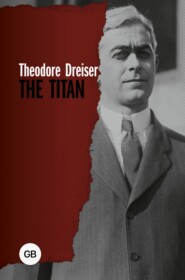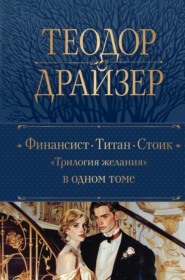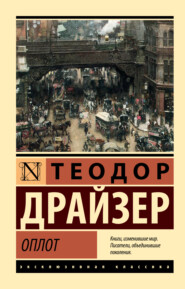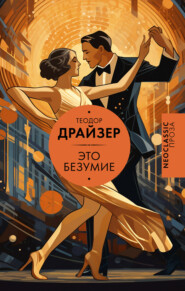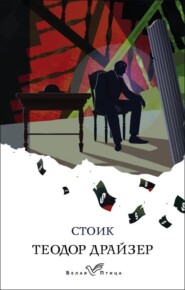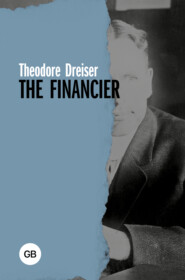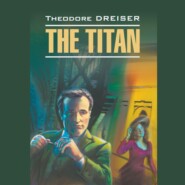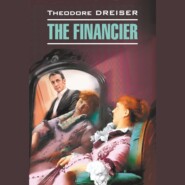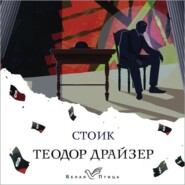По всем вопросам обращайтесь на: info@litportal.ru
(©) 2003-2025.
✖
The "Genius"
Настройки чтения
Размер шрифта
Высота строк
Поля
"Well, I'm ready now. You needn't come to see me unless you want to. I can get along."
She tossed her head.
"Don't be foolish, Margy," he said, seeing the ill wind he had aroused. "You don't mean that."
"Don't I? Well, we'll see." She walked away from him to another corner of the room. He followed her, but her anger re-aroused his opposition. "Oh, all right," he said after a time. "I guess I'd better be going."
She made no response, neither pleas nor suggestions. He went and secured his hat and coat and came back. "Want to kiss me good-bye?" he inquired.
"No," she said simply.
"Good-night," he called.
"Good-night," she replied indifferently.
The relationship was never amicably readjusted after this, although it did endure for some time.
CHAPTER V
For the time being this encounter stirred to an almost unbridled degree Eugene's interest in women. Most men are secretly proud of their triumph with woman – their ability to triumph – and any evidence of their ability to attract, entertain, hold, is one of those things which tends to give them an air of superiority and self-sufficiency which is sometimes lacking in those who are not so victorious. This was, in its way, his first victory of the sort, and it pleased him mightily. He felt much more sure of himself instead of in any way ashamed. What, he thought, did the silly boys back in Alexandria know of life compared to this? Nothing. He was in Chicago now. The world was different. He was finding himself to be a man, free, individual, of interest to other personalities. Margaret Duff had told him many pretty things about himself. She had complimented his looks, his total appearance, his taste in the selection of particular things. He had felt what it is to own a woman. He strutted about for a time, the fact that he had been dismissed rather arbitrarily having little weight with him because he was so very ready to be dismissed, sudden dissatisfaction with his job now stirred up in him, for ten dollars a week was no sum wherewith any self-respecting youth could maintain himself, – particularly with a view to sustaining any such relationship as that which had just ended. He felt that he ought to get a better place.
Then one day a woman to whom he was delivering a parcel at her home in Warren Avenue, stopped him long enough to ask: "What do you drivers get a week for your work?"
"I get ten dollars," said Eugene. "I think some get more."
"You ought to make a good collector," she went on. She was a large, homely, incisive, straight-talking woman. "Would you like to change to that kind of work?"
Eugene was sick of the laundry business. The hours were killing. He had worked as late as one o'clock Sunday morning.
"I think I would," he exclaimed. "I don't know anything about it, but this work is no fun."
"My husband is the manager of The People's Furniture Company," she went on. "He needs a good collector now and then. I think he's going to make a change very soon. I'll speak to him."
Eugene smiled joyously and thanked her. This was surely a windfall. He was anxious to know what collectors were paid but he thought it scarcely tactful to ask.
"If he gives you a job you will probably get fourteen dollars to begin with," she volunteered.
Eugene thrilled. That would be really a rise in the world. Four dollars more! He could get some nice clothes out of that and have spending money besides. He might get a chance to study art. His visions began to multiply. One could get up in the world by trying. The energetic delivery he had done for this laundry had brought him this. Further effort in the other field might bring him more. And he was young yet.
He had been working for the laundry company for six months. Six weeks later, Mr. Henry Mitchly, manager of the People's Furniture, wrote him care of the laundry company to call at his home any evening after eight and he would see him. "My wife has spoken to me of you," he added.
Eugene complied the same day that he received the note, and was looked over by a lean, brisk, unctuous looking man of forty, who asked him various questions as to his work, his home, how much money he took in as a driver, and what not. Finally he said, "I need a bright young man down at my place. It's a good job for one who is steady and honest and hardworking. My wife seems to think you work pretty well, so I'm willing to give you a trial. I can put you to work at fourteen dollars. I want you to come to see me a week from Monday."
Eugene thanked him. He decided, on Mr. Mitchly's advice, to give his laundry manager a full week's notice. He told Margaret that he was leaving and she was apparently glad for his sake. The management was slightly sorry, for Eugene was a good driver. During his last week he helped break in a new man in his place, and on Monday appeared before Mr. Mitchly.
Mr. Mitchly was glad to have him, for he had seen him as a young man of energy and force. He explained the simple nature of the work, which was to take bills for clocks, silverware, rugs, anything which the company sold, and go over the various routes collecting the money due, – which would average from seventy five to a hundred and twenty-five dollars a day. "Most companies in our line require a bond," he explained, "but we haven't come to that yet. I think I know honest young men when I see them. Anyhow we have a system of inspection. If a man's inclined to be dishonest he can't get very far with us."
Eugene had never thought of this question of honesty very much. He had been raised where he did not need to worry about the matter of a little pocket change, and he had made enough at the Appeal to supply his immediate wants. Besides, among the people he had always associated with it was considered a very right and necessary thing to be honest. Men were arrested for not being. He remembered one very sad case of a boy he knew being arrested at Alexandria for breaking into a store at night. That seemed a terrible thing to him at the time. Since then he had been speculating a great deal, in a vague way as to what honesty was, but he had not yet decided. He knew that it was expected of him to account for the last penny of anything that was placed in his keeping and he was perfectly willing to do so. The money he earned seemed enough if he had to live on it. There was no need for him to aid in supporting anyone else. So he slipped along rather easily and practically untested.
Eugene took the first day's package of bills as laid out for him, and carefully went from door to door. In some places money was paid him for which he gave a receipt, in others he was put off or refused because of previous difficulties with the company. In a number of places people had moved, leaving no trace of themselves, and packing the unpaid for goods with them. It was his business, as Mr. Mitchly explained, to try to get track of them from the neighbors.
Eugene saw at once that he was going to like the work. The fresh air, the out-door life, the walking, the quickness with which his task was accomplished, all pleased him. His routes took him into strange and new parts of the city, where he had never been before, and introduced him to types he had never met. His laundry work, taking him from door to door, had been a freshening influence, and this was another. He saw scenes that he felt sure he could, when he had learned to draw a little better, make great things of, – dark, towering factory-sites, great stretches of railroad yards laid out like a puzzle in rain, snow, or bright sunlight; great smoke-stacks throwing their black heights athwart morning or evening skies. He liked them best in the late afternoon when they stood out in a glow of red or fading purple. "Wonderful," he used to exclaim to himself, and think how the world would marvel if he could ever come to do great pictures like those of Doré. He admired the man's tremendous imagination. He never thought of himself as doing anything in oils or water colors or chalk – only pen and ink, and that in great, rude splotches of black and white. That was the way. That was the way force was had.
But he could not do them. He could only think them.
One of his chief joys was the Chicago river, its black, mucky water churned by puffing tugs and its banks lined by great red grain elevators and black coal chutes and yellow lumber yards. Here was real color and life – the thing to draw; and then there were the low, drab, rain-soaked cottages standing in lonely, shabby little rows out on flat prairie land, perhaps a scrubby tree somewhere near. He loved these. He would take an envelope and try to get the sense of them – the feel, as he called it – but it wouldn't come. All he did seemed cheap and commonplace, mere pointless lines and stiff wooden masses. How did the great artists get their smoothness and ease? He wondered.
CHAPTER VI
Eugene collected and reported faithfully every day, and had managed to save a little money. Margaret was now a part of his past. His landlady, Mrs. Woodruff, had gone to live with a daughter in Sedalia, Missouri, and he had moved to a comparatively nice house in East Twenty-first Street on the South Side. It had taken his eye because of a tree in a fifty foot space of ground before it. Like his other room it cost him little, and he was in a private family. He arranged a twenty cent rate per meal for such meals as he took there, and thus he managed to keep his bare living expenses down to five dollars a week. The remaining nine he spent sparingly for clothes, car-fare, and amusements – almost nothing of the latter. When he saw he had a little money in reserve he began to think of looking up the Art Institute, which had been looming up in his mind as an avenue of advancement, and find out on what condition he could join a night class in drawing. They were very reasonable, he heard, only fifteen dollars a quarter, and he decided to begin if the conditions were not too severe. He was beginning to be convinced that he was born to be an artist – how soon he could not tell.
The old Art Institute, which preceded the present impressive structure, was located at Michigan Avenue and Monroe Street, and presented an atmosphere of distinction which was not present in most of the structures representing the public taste of the period. It was a large six storey building of brown stone, and contained a number of studios for painters, sculptors, and music teachers, besides the exhibition rooms and the rooms for the classes. There were both day and evening classes, and even at that time a large number of students. The western soul, to a certain extent, was fired by the wonder of art. There was so little of it in the life of the people – the fame of those who could accomplish things in this field and live in a more refined atmosphere was great. To go to Paris! To be a student in any one of the great ateliers of that city! Or of Munich or Rome, to know the character of the artistic treasures of Europe – the life of the Art quarter – that was something. There was what might have been termed a wild desire in the breast of many an untutored boy and girl to get out of the ranks of the commonplace; to assume the character and the habiliments of the artistic temperament as they were then supposed to be; to have a refined, semi-languorous, semi-indifferent manner; to live in a studio, to have a certain freedom in morals and temperament not accorded to the ordinary person – these were the great things to do and be. Of course, art composition was a part of this. You were supposed ultimately to paint great pictures or do noble sculptures, but in the meanwhile you could and should live the life of the artist. And that was beautiful and wonderful and free.
Eugene had long had some sense of this. He was aware that there were studios in Chicago; that certain men were supposed to be doing good work – he saw it in the papers. There were mentions now and then of exhibitions, mostly free, which the public attended but sparingly. Once there was an exhibition of some of the war pictures of Verestchagin, a great Russian painter who had come West for some purpose. Eugene saw them one Sunday afternoon, and was enthralled by the magnificence of their grasp of the elements of battle; the wonder of color; the truth of character; the dramatic quality; the sense of force and danger and horror and suffering which was somehow around and in and through everything that was shown. This man had virility and insight; stupendous imagination and temperament. Eugene stood and stared, wondering how such things could be done. Ever afterward the name of Verestchagin was like a great call to his imagination; that was the kind of an artist to be if you were going to be one.
Another picture came there once, which appealed to another side of his nature, although primarily the basis of its appeal was artistic. It was a great, warm tinted nude by Bouguereau, a French artist who was startling his day with his daring portrayal of the nude. The types he depicted were not namby-pamby little slim-bodied women with spindling qualities of strength and passion, but great, full-blown women whose voluptuous contour of neck and arms and torso and hip and thigh was enough to set the blood of youth at fever heat. The man obviously understood and had passion, love of form, love of desire, love of beauty. He painted with a sense of the bridal bed in the background; of motherhood and of fat, growing babies, joyously nursed. These women stood up big in their sense of beauty and magnetism, the soft lure of desire in their eyes, their full lips parted, their cheeks flushed with the blood of health. As such they were anathema to the conservative and puritanical in mind, the religious in temperament, the cautious in training or taste. The very bringing of this picture to Chicago as a product for sale was enough to create a furore of objection. Such pictures should not be painted, was the cry of the press; or if painted, not exhibited. Bouguereau was conceived of by many as one of those dastards of art who were endeavoring to corrupt by their talent the morals of the world; there was a cry raised that the thing should be suppressed; and as is always the case in all such outbursts of special class opposition, the interest of the general public was aroused.
Eugene was one of those who noted the discussion. He had never seen a picture by Bouguereau or, indeed, an original nude by any other artist. Being usually at liberty after three o'clock, he was free to visit some of these things, and having found it possible to do his work in good clothes he had come to wear his best suit every day. He was a fairly presentable youth with a solemn mien, and his request to be shown anything in any art store would have aroused no surprise. He looked as though he belonged to the intellectual and artistic classes.
Not being sure of what reception would be accorded one so young – he was now nearing twenty – he nevertheless ventured to stop at the gallery where the Bouguereau was being exhibited and ask to see it. The attendant in charge eyed him curiously, but led him back to a room hung in dark red, and turning on a burst of incandescent bulbs set in the ceiling of a red plush hung cabinet, pulled back the curtain revealing the picture. Eugene had never seen such a figure and face. It was a dream of beauty – his ideal come to life. He studied the face and neck, the soft mass of brown, sensuous hair massed at the back of the head, the flowerlike lips and soft cheeks. He marveled at the suggestion of the breasts and the abdomen, that potentiality of motherhood that is so firing to the male. He could have stood there hours dreaming, luxuriating, but the attendant who had left him alone with it for a few minutes returned.
"What is the price of this?" Eugene asked.
"Ten thousand dollars," was the reply.
He smiled solemnly. "It's a wonderful thing," he said, and turned to go. The attendant put out the light.
This picture, like those of Verestchagin, made a sharp impression on him. Curiously he had no longing to paint anything of this kind. He only rejoiced to look at it. It spoke to him of his present ideal of womanhood – physical beauty, and he longed with all his heart to find a creature like that who would look on him with favor.
There were other exhibitions – one containing a genuine Rembrandt – which impressed him, but none like these that had definitely stirred him. His interest in art was becoming eager. He wanted to find out all about it – to do something himself. One day he ventured to call at the Art Institute building and consult the secretary, who explained to him what the charges were. He learned from her, for she was a woman of a practical, clerical turn, that the classes ran from October to May, that he could enter a life or antique class or both, though the antique alone was advisable for the time, and a class in illustration, where costumes of different periods were presented on different models. He found that each class had an instructor of supposed note, whom it was not necessary for him to see. Each class had a monitor and each student was supposed to work faithfully for his own benefit. Eugene did not get to see the class rooms, but he gained a sense of the art of it all, nevertheless, for the halls and offices were decorated in an artistic way, and there were many plaster casts of arms, legs, busts, and thighs and heads. It was as though one stood in an open doorway and looked out upon a new world. The one thing that gratified him was that he could study pen and ink or brush in the illustration class, and that he could also join a sketch class from five to six every afternoon without extra charges if he preferred to devote his evening hours to studying drawing in the life class. He was a little astonished to learn from a printed prospectus given him that the life class meant nude models to work from – both men and women. He was surely approaching a different world now. It seemed necessary and natural enough, and yet there was an aloof atmosphere about it, something that suggested the inner precincts of a shrine, to which only talent was admitted. Was he talented? Wait! He would show the world, even if he was a raw country boy.
The classes which he decided to enter were first a life class which convened Monday, Wednesday and Friday evenings at seven in one of the study rooms and remained in session until ten o'clock, and second a sketch class which met from five to six every afternoon. Eugene felt that he knew little or nothing about figure and anatomy and had better work at that. Costume and illustration would have to wait, and as for the landscapes, or rather city-scapes, of which he was so fond, he could afford to defer those until he learned something of the fundamentals of art.
Heretofore he had rarely attempted the drawing of a face or figure except in miniature and as details of a larger scene. Now he was confronted with the necessity of sketching in charcoal the head or body of a living person, and it frightened him a little. He knew that he would be in a class with fifteen or twenty other male students. They would be able to see and comment on what he was doing. Twice a week an instructor would come around and pass upon his work. There were honors for those who did the best work during any one month, he learned from the prospectus, namely: first choice of seats around the model at the beginning of each new pose. The class instructors must be of considerable significance in the American art world, he thought, for they were N. A.'s, and that meant National Academicians. He little knew with what contempt this honor was received in some quarters, or he would not have attached so much significance to it.
One Monday evening in October, armed with the several sheets of paper which he had been told to purchase by his all-informing prospectus, he began his work. He was a little nervous at sight of the brightly lighted halls and class rooms, and the moving crowd of young men and women did not tend to allay his fears. He was struck at once with the quality of gaiety, determination and easy grace which marked the different members of this company. The boys struck him as interesting, virile, in many cases good looking; the girls as graceful, rather dashing and confident. One or two whom he noted were beautiful in a dark way. This was a wonderful world.
The rooms too, were exceptional. They were old enough in use to be almost completely covered, as to the walls, with the accumulation of paint scraped from the palettes. There were no easels or other paraphernalia, but simply chairs and little stools – the former, as Eugene learned, to be turned upside down for easels, the latter for the students to sit on. In the center of the room was a platform, the height of an ordinary table, for the model to pose on, and in one corner a screen which constituted a dressing room. There were no pictures or statuary – just the bare walls – but curiously, in one corner, a piano. Out in the halls and in the general lounging center were pictures of nude figures or parts of figures posed in all sorts of ways which Eugene, in his raw, youthful way, thought suggestive. He secretly rejoiced to look at them but he felt that he must not say anything about what he thought. An art student, he felt sure, must appear to be indifferent to such suggestion – to be above such desire. They were here to work, not to dream of women.
When the time came for the classes to assemble there was a scurrying to and fro, conferring between different students, and then the men found themselves in one set of rooms and the women in another. Eugene saw a young girl in his room, sitting up near the screen, idly gazing about. She was pretty, of a slightly Irish cast of countenance, with black hair and black eyes. She wore a cap that was an imitation of the Polish national head-dress, and a red cape. Eugene assumed her to be the class model and secretly wondered if he was really to see her in the nude. In a few minutes all the students were gathered, and then there was a stir as there strolled in a rather vigorous and picturesque man of thirty-six or thereabouts, who sauntered to the front of the room and called the class to order. He was clad in a shabby suit of grey tweed and crowned with a little brown hat, shoved rakishly over one ear, which he did not trouble to take off. He wore a soft blue hickory shirt without collar or tie, and looked immensely self-sufficient. He was tall and lean and raw-boned, with a face which was long and narrow; his eyes were large and wide set, his mouth big and firm in its lines; he had big hands and feet, and an almost rolling gait. Eugene assumed instinctively that this was Mr. Temple Boyle, N. A., the class instructor, and he imagined there would be an opening address of some kind. But the instructor merely announced that Mr. William Ray had been appointed monitor and that he hoped that there would be no disorder or wasting of time. There would be regular criticism days by him – Wednesdays and Fridays. He hoped that each pupil would be able to show marked improvement. The class would now begin work. Then he strolled out.
Eugene soon learned from one of the students that this really was Mr. Boyle. The young Irish girl had gone behind the screen. Eugene could see partially, from where he was sitting, that she was disrobing. It shocked him a little, but he kept his courage and his countenance because of the presence of so many others. He turned a chair upside down as he saw the others do, and sat down on a stool. His charcoal was lying in a little box beside him. He straightened his paper on its board and fidgeted, keeping as still as he could. Some of the students were talking. Suddenly he saw the girl divest herself of a thin, gauze shirt, and the next moment she came out, naked and composed, to step upon the platform and stand perfectly erect, her arms by her side, her head thrown back. Eugene tingled and blushed and was almost afraid to look directly at her. Then he took a stick of charcoal and began sketching feebly, attempting to convey something of this personality and this pose to paper. It seemed a wonderful thing for him to be doing – to be in this room, to see this girl posing so; in short, to be an art student. So this was what it was, a world absolutely different from anything he had ever known. And he was self-called to be a member of it.
CHAPTER VII
It was after he had decided to enter the art class that Eugene paid his first visit to his family. Though they were only a hundred miles away, he had never felt like going back, even at Christmas. Now it seemed to him he had something definite to proclaim. He was going to be an artist; and as to his work, he was getting along well in that. Mr. Mitchly appeared to like him. It was to Mr. Mitchly that he reported daily with his collections and his unsatisfied bills. The collections were checked up by Mr. Mitchly with the cash, and the unpaid bills certified. Sometimes Eugene made a mistake, having too much or too little, but the "too much" was always credited against the "too little," so that in the main he came out even. In money matters there was no tendency on Eugene's part to be dishonest. He thought of lots of things he wanted, but he was fairly well content to wait and come by them legitimately. It was this note in him that appealed to Mitchly. He thought that possibly something could be made of Eugene in a trade way.
He left the Friday night preceding Labor Day, the first Monday in September, which was a holiday throughout the city. He had told Mr. Mitchly that he thought of leaving Saturday after work for over Sunday and Monday, but Mr. Mitchly suggested that he might double up his Saturday's work with Thursday's and Friday's if he wished, and go Friday evening.






